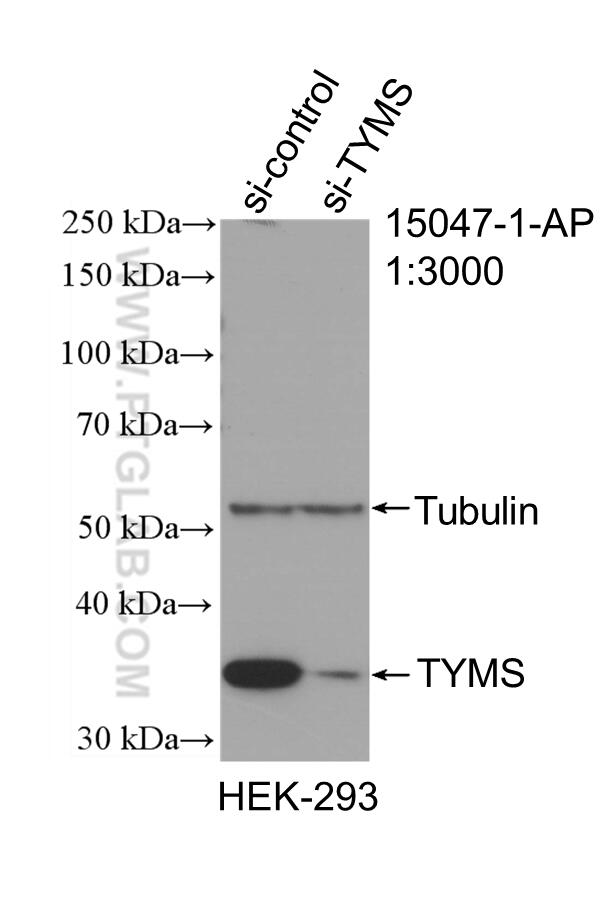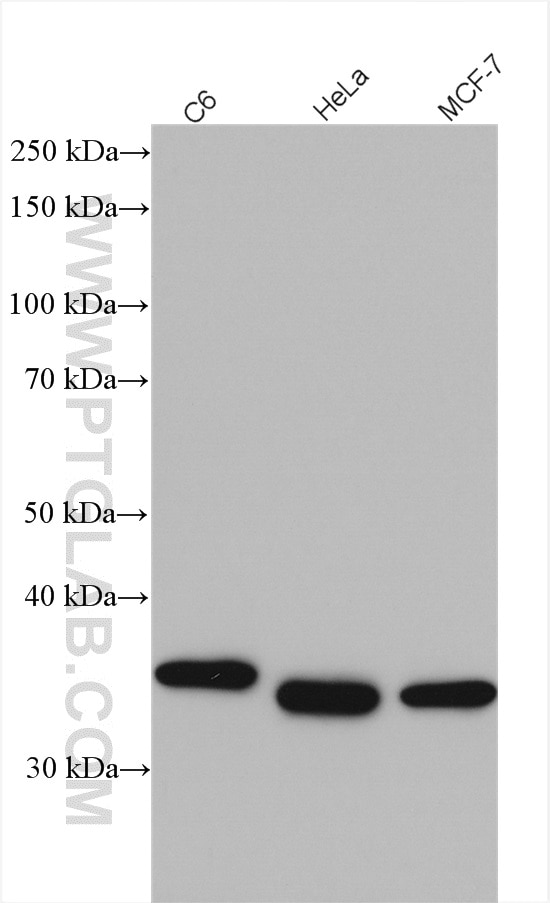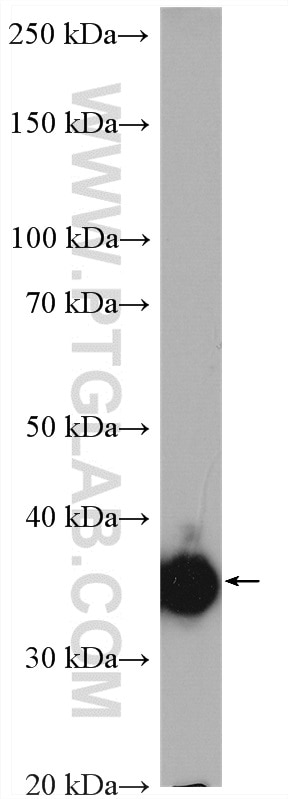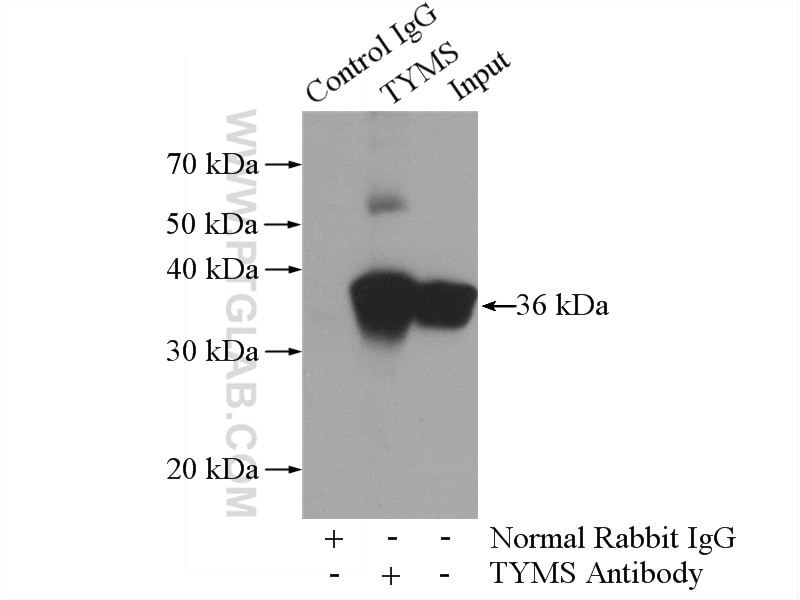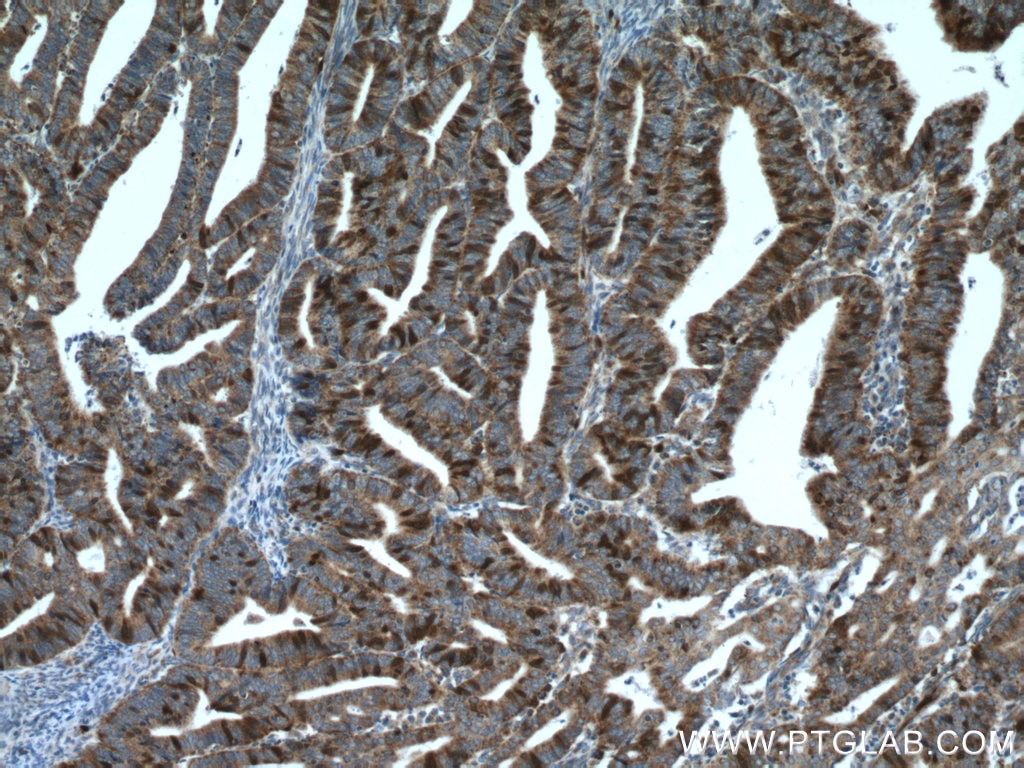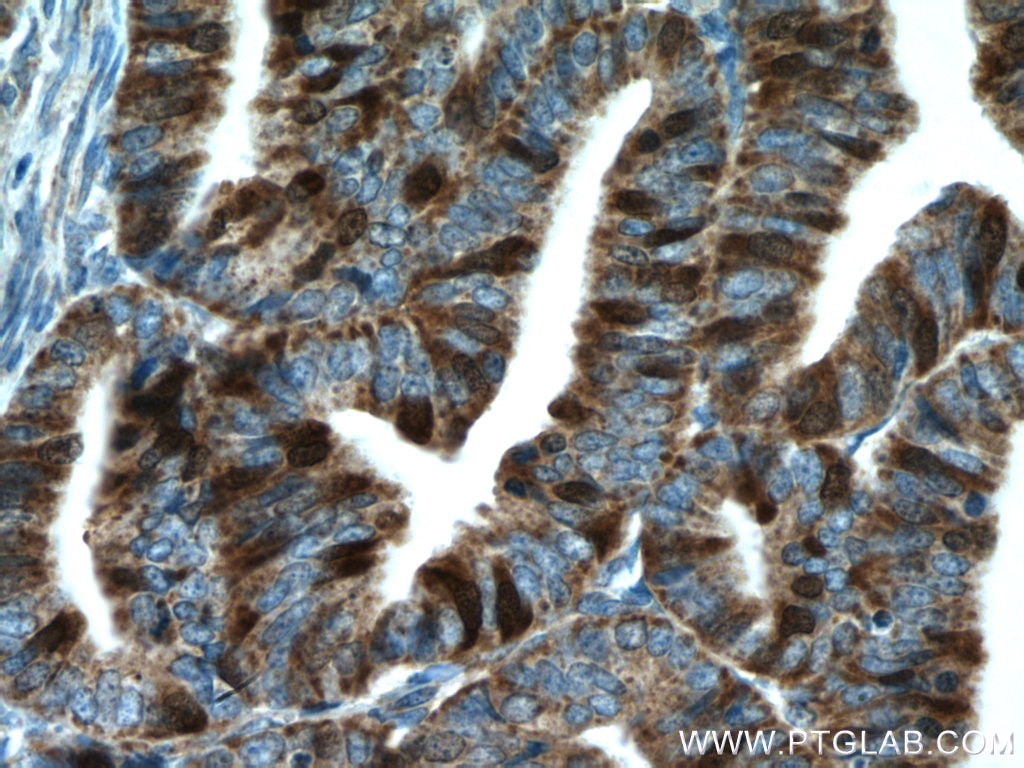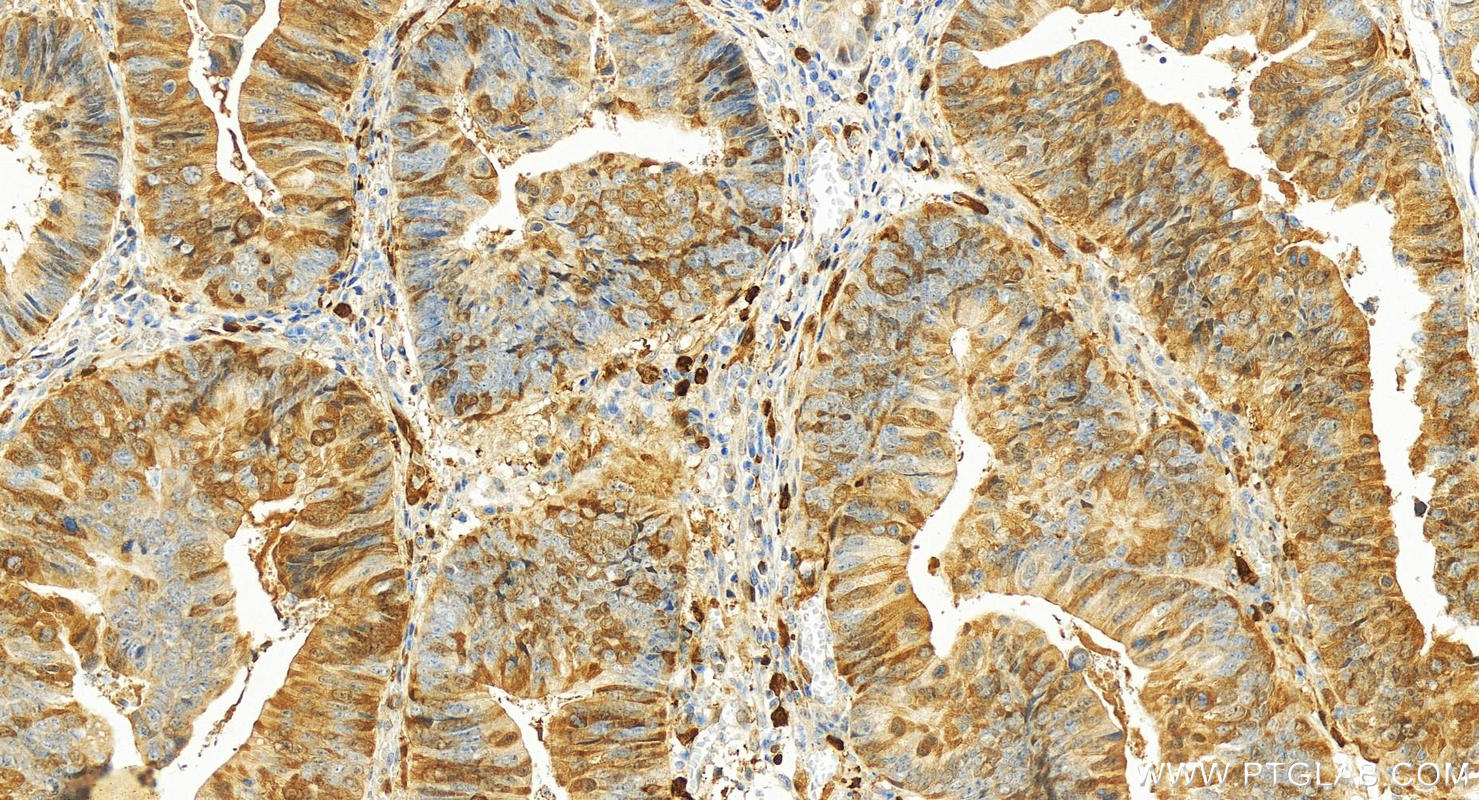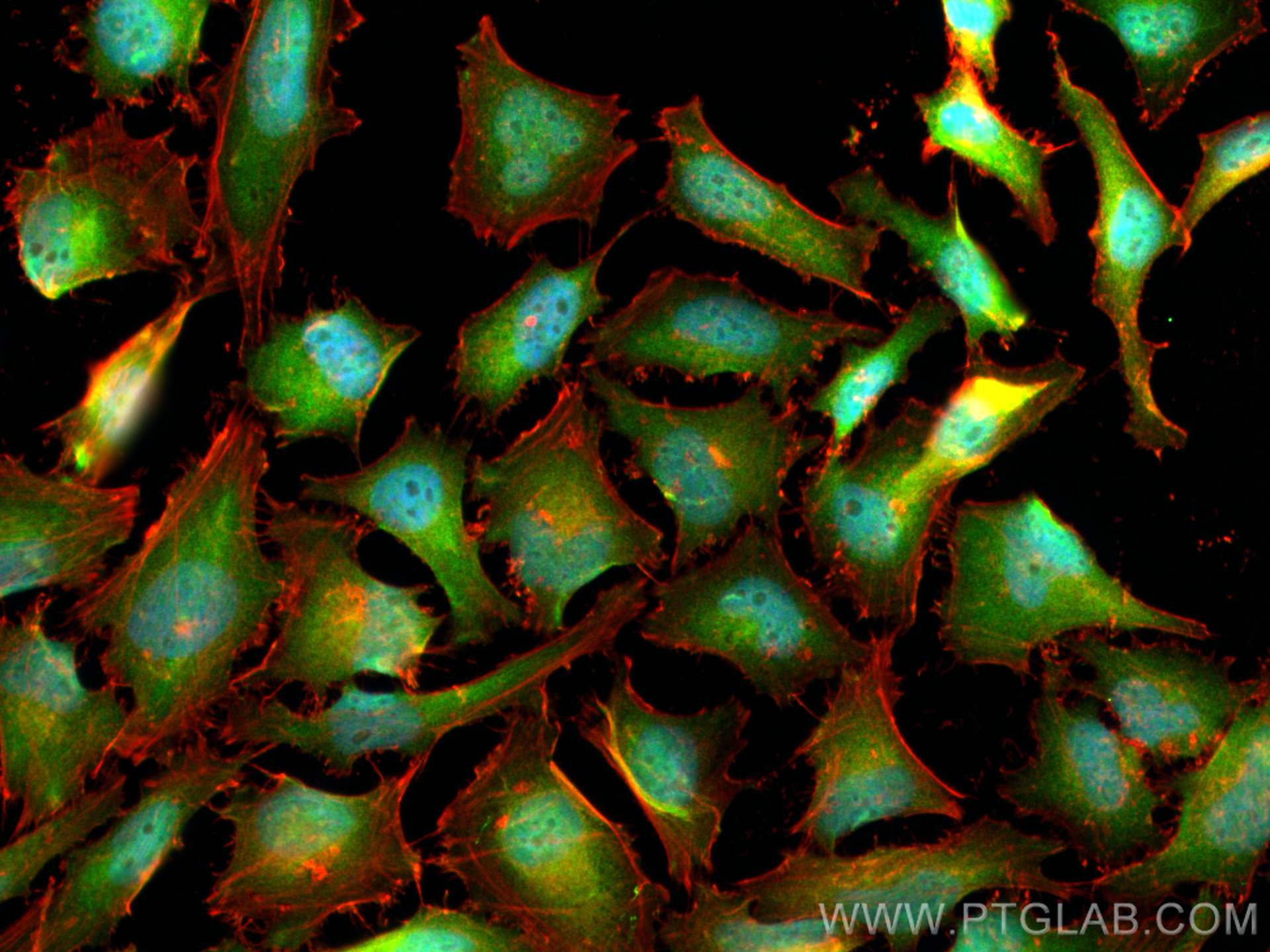Tested Applications
| Positive WB detected in | HeLa cells, HEK-293T cells, HEK-293 cells, MCF-7 cells |
| Positive IP detected in | HeLa cells |
| Positive IHC detected in | human endometrial cancer tissue, human colon cancer tissue Note: suggested antigen retrieval with TE buffer pH 9.0; (*) Alternatively, antigen retrieval may be performed with citrate buffer pH 6.0 |
| Positive IF/ICC detected in | HeLa cells |
Recommended dilution
| Application | Dilution |
|---|---|
| Western Blot (WB) | WB : 1:500-1:5000 |
| Immunoprecipitation (IP) | IP : 0.5-4.0 ug for 1.0-3.0 mg of total protein lysate |
| Immunohistochemistry (IHC) | IHC : 1:50-1:500 |
| Immunofluorescence (IF)/ICC | IF/ICC : 1:50-1:500 |
| It is recommended that this reagent should be titrated in each testing system to obtain optimal results. | |
| Sample-dependent, Check data in validation data gallery. | |
Published Applications
| KD/KO | See 6 publications below |
| WB | See 29 publications below |
| IHC | See 8 publications below |
| IF | See 2 publications below |
| CoIP | See 1 publications below |
Product Information
15047-1-AP targets Thymidylate synthase in WB, IHC, IF/ICC, IP, CoIP, ELISA applications and shows reactivity with human, mouse, rat samples.
| Tested Reactivity | human, mouse, rat |
| Cited Reactivity | human, mouse |
| Host / Isotype | Rabbit / IgG |
| Class | Polyclonal |
| Type | Antibody |
| Immunogen |
CatNo: Ag7027 Product name: Recombinant human TYMS protein Source: e coli.-derived, PGEX-4T Tag: GST Domain: 1-313 aa of BC002567 Sequence: MPVAGSELPRRPLPPAAQERDAEPRPPHGELQYLGQIQHILRCGVRKDDRTGTGTLSVFGMQARYSLRDEFPLLTTKRVFWKGVLEELLWFIKGSTNAKELSSKGVKIWDANGSRDFLDSLGFSTREEGDLGPVYGFQWRHFGAEYRDMESDYSGQGVDQLQRVIDTIKTNPDDRRIIMCAWNPRDLPLMALPPCHALCQFYVVNSELSCQLYQRSGDMGLGVPFNIASYALLTYMIAHITGLKPGDFIHTLGDAHIYLNHIEPLKIQLQREPRPFPKLRILRKVEKIDDFKAEDFQIEGYNPHPTIKMEMAV Predict reactive species |
| Full Name | thymidylate synthetase |
| Calculated Molecular Weight | 36 kDa |
| Observed Molecular Weight | 32-36 kDa |
| GenBank Accession Number | BC002567 |
| Gene Symbol | TYMS |
| Gene ID (NCBI) | 7298 |
| RRID | AB_2210721 |
| Conjugate | Unconjugated |
| Form | Liquid |
| Purification Method | Antigen affinity purification |
| UNIPROT ID | P04818 |
| Storage Buffer | PBS with 0.02% sodium azide and 50% glycerol, pH 7.3. |
| Storage Conditions | Store at -20°C. Stable for one year after shipment. Aliquoting is unnecessary for -20oC storage. 20ul sizes contain 0.1% BSA. |
Background Information
Thymidylate synthase gene (TYMS) encodes thymidylate synthase (TS) which is an important factor in the growth of tumor cells. TS can catalyze the transformation of intracellular uridine monophosphate (dump) into dTMP which is required for DNA replication and repairing. TS is a key enzyme in the process of cell proliferation, also is the important target enzymes of 5-FU and other chemotherapy drugs. The expression of TYMS is negatively correlated with the efficacy of chemotherapy and the prognosis of patients who suffer from rectal cancer, breast cancer, colorectal cancer, gastric cancer, head and neck cancer, esophageal cancer, pancreatic cancer and so on.
Protocols
| Product Specific Protocols | |
|---|---|
| IF protocol for Thymidylate synthase antibody 15047-1-AP | Download protocol |
| IHC protocol for Thymidylate synthase antibody 15047-1-AP | Download protocol |
| IP protocol for Thymidylate synthase antibody 15047-1-AP | Download protocol |
| WB protocol for Thymidylate synthase antibody 15047-1-AP | Download protocol |
| Standard Protocols | |
|---|---|
| Click here to view our Standard Protocols |
Publications
| Species | Application | Title |
|---|---|---|
J Pineal Res Melatonin modulates metabolic remodeling in HNSCC by suppressing MTHFD1L-formate axis. | ||
Nat Commun CETSA screening identifies known and novel thymidylate synthase inhibitors and slow intracellular activation of 5-fluorouracil. | ||
Cancer Res 5-Fluorouracil Enhances the Antitumor Activity of the Glutaminase Inhibitor CB-839 against PIK3CA-Mutant Colorectal Cancers. | ||
Cell Rep The mTORC1 Signaling Network Senses Changes in Cellular Purine Nucleotide Levels. | ||
Cell Chem Biol CETSA interaction proteomics define specific RNA-modification pathways as key components of fluorouracil-based cancer drug cytotoxicity. | ||
Oxid Med Cell Longev lncRNA IGF2-AS Regulates Nucleotide Metabolism by Mediating HMGA1 to Promote Pyroptosis of Endothelial Progenitor Cells in Sepsis Patients.
|

